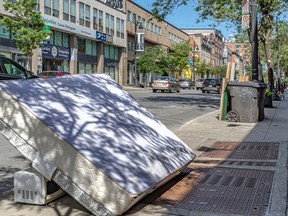Let’s think outside the (recycling) box and study how AI could be used to help manage the mountains of unwanted household items.

Mountains of Moving Day waste in Quebec reveal the hidden sustainability problem of household goods. Data could keep these out of the landfill.
Trash2Treasure, though wonderful, is a Band-Aid solution; it mitigates the impact, but doesn’t address the root causes or systemic issues to make a real dent in the problem.
The truth is, we buy more things than we need. And we struggle with what to do with those things when we don’t need them. If items aren’t worth selling and we lack the time or the means to donate or recycle them at ecocentres, storage is the path of least resistance.
Researchers have focused their studies on the more visible waste types and waste-related behaviours, especially recycling consumer packaging and sorting food waste for compost. But recycling is not the miracle cure we once thought. It’s increasingly clear how essential it is we adopt reuse behaviours, which, unfortunately, are critically understudied.
The problem is that reducing and reusing don’t have clear steps like curbside recycling; there isn’t a bin outside each home to collect items for reuse. People must navigate this process themselves. To sell your household goods, you must operate what feels like your own mini e-commerce business through eBay or Kijiji or haul items over to a donation drop-off bin, which may not even accept non-clothing items.
More local bins, reuse centres and municipal policies that discourage landfilling could go a long way.
But one of the least costly investments could be data systems. Imagine using smartphones to connect citizens who have items with those who need them. We shop online as our default because Amazon conveniently delivers what we need. Reuse initiatives able to match that level of convenience would be a game-changer. Instead of artificial intelligence nudging us to buy more, it could alert us when neighbours are disposing items we need and incentivize participation in the exchange of used goods.
However, projects like this are currently stopgap solutions, just like Trash2Treasure. What’s missing is rigorous R&D for the benefit of society. We need to scale up smaller initiatives and marry them with data systems and policies that maximize participation.
At a time when the cost of living is squeezing Canadians’ budgets beyond their capacity, the societal cost savings would be a huge boon. The ecological savings would, on the other hand, be an important step toward sustaining our future.
Faisal Shennib is a PhD candidate and 2024-’25 public scholar at Concordia University studying data-driven solutions for waste management.